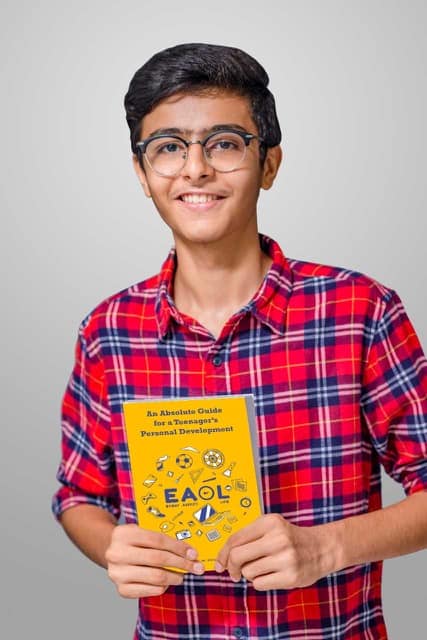



It’s not just the 20-somethings who are getting into start-ups and chasing their dreams. Kids as young as in their teens are raking in the moolah. They are confident, have acumen, and already talk about ‘Investing Surplus’, ‘Generated profits’, ‘Incurred expenses’, ‘Spent on logistics and packaging’ and the usual business lingo just like the corner office executives in plush offices.
Twelve-year-old Inaya Bassi has adorned the chef’s hat to whip up 300 besan barfi boxes, while 13-year-old Kashvi Shah is busy getting the next batch of perfumes ready for her recurring clients enchanted by her range of fragrance.
Loukikk Chhatbar, all of 16 years, has self-published his book E.A.O.L and is selling the same on Amazon. Another 13-year-old Russhil Chawla has developed many websites including those for leading schools and colleges.
Utilising slack-study periodA common thread tying these children is the drive to offer solutions and the zest to utilise vacations and post-board exams sluggish time period.
 Kashvi Shah.
Kashvi Shah.Kashvi Shah wanted to gift her mother a handmade perfume on her birthday. She requested her aunt to help her. The appreciation for the fragrance led her to utilise her vacations for perfume-making workshops. These were later put to good use in creating ‘Hypnosant’ brand of perfumes. “I have sold 107 bottles so far and used 40 bottles for marketing and reviews,” says Shah.
Initial funding and diverting surplusWhile these children have used funds from parents to purchase initial ingredients, arrange logistics and even packaging, they have made sure to return each penny. “I sourced Rs 50,000 from my father, which was used for publishing, desk-top publishing, proof-reading and so on. So, whenever I sold the books and recovered the funds I made sure I paid him the initial funds back. I am using the surplus money now for the upgraded edition of my existing book and for the second book that is in the offing,” says Chhatbar.
The balance that is left is directed towards the own business and even for philanthropic causes.
Both Russhil Chawla and Inaya Bassi have donated notable amounts to orphanages. “Last Diwali we donated Rs 50,000 to Bal Asha after deducting expenses and keeping aside a sum for reinvesting in the venture. I am aiming to double that amount this year,” says Bassi, who is juggling about 11 orders a month currently.
 Inaya Bassi.
Inaya Bassi.“I have to invest in cooking equipment, labour, weighing scale, packaging for normal deliveries and even hampers. So, I set aside some money so that I can purchase Christmas packaging in advance to avoid surge pricing during December,” she adds in the midst of experimenting new menu for upcoming holidays. She has kept tab on pricing too due to the inflationary pressure that food ingredients have witnessed.
Investing the surplusWhile most of the child-preneurs said they would like to reinvest the money into their businesses, Priyansh Sata and Chhatbar have also taken the plunge into investing. “I have invested in Nykaa IPO through my dad as I want to include investing lessons for teenagers in my upcoming book,” said Chhatbar.
 Loukikk Chhatbar.
Loukikk Chhatbar.Sata, who helped a family friend launch Sapphire Inc on Amazon, is learning the tricks of the market trade through virtual trading exchanges. Investment advisors suggest that virtual trading is a far better way for testing riskier assets for such young investors.
“They should invest in equity savings schemes, offered by mutual funds, which have a higher debt component and an option to invest up to 50 percent in equity as the index is currently in the riskier zone. Balanced funds can be another option for these young investors in the current market scenario,” says Jayant Vidwans, director of Allstages Financial Services.
He warns them to steer clear of initial public offers (IPOs) as many listed company shares are available at deep discounts of their public issue prices. “Cryptocurrencies, too, fascinate many, but they should be avoided as they are extremely volatile. Besides, in India, their legality and continuance are still in question,” says Vidwans.
Alternative investment optionsAs entrepreneurs, these children would be risking their own capital. Hence while opting for investment products they should exercise caution. “Well-regulated mutual fund schemes can serve as low-cost investment products for the long investment horizon that these children have. They can opt for large and mid-cap schemes for their long-term needs and liquid funds to park their short-term surplus, which they aren’t sure when they would have to deploy in business,” says Ajay Sehgal, co-founder and director of Allegiance Financial.
When you invest in a child’s name, a bank account is also required in the name of the kid. In both these cases, the first holder has to be the child. All investments in a mutual fund scheme require a Permanent Account Number.
They should also separate their own individual assets from business assets. “Instead of earning and re-investing in business, they should set up a system wherein they withdraw salary or director’s remuneration each month and segregate personal assets,” Sehgal adds.
Early investing offers these children the advantage of compounding. So, if they invest Rs 1 lakh yearly for 20 years (Rs 21 lakh invested), the same would grow to Rs 70 lakh, if the investment grows by 10 percent.. It could grow to Rs 1.34 crore if the investments fetch 15 percent returns.
So, by the time these 12-13 year olds turn 33, they would be self-made crorepatis all due to compounding of early investments. This would be difficult to achieve if they delay this investment by 10 years. So, if they even double the investment amount to Rs 2 lakh and invest for 10 years, then they would accumulate Rs 40 lakh at 10 percent return and Rs 54 lakh at 15 percent return.
Discover the latest Business News, Sensex, and Nifty updates. Obtain Personal Finance insights, tax queries, and expert opinions on Moneycontrol or download the Moneycontrol App to stay updated!
Find the best of Al News in one place, specially curated for you every weekend.
Stay on top of the latest tech trends and biggest startup news.